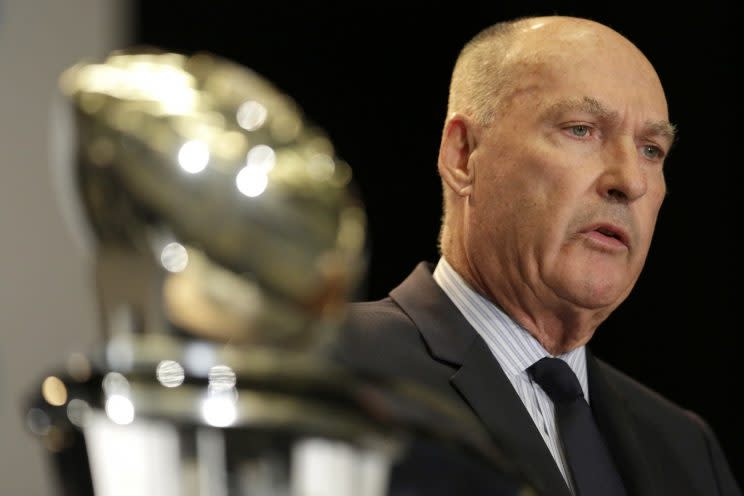Jim Delany confirms Big Ten's massive TV deal, adjustment to FCS scheduling policy

It took a while, but the Big Ten’s television arrangements are finally official.
At Big Ten Media Days Monday morning, commissioner Jim Delany confirmed — more than a year after it was first reported — that the conference has agreements in place with ESPN and Fox to continue to carry its games. Delany, who addressed reporters with representatives from both networks, did not confirm the monetary value of the deal, which is reported to be worth a whopping $2.64 billion.
“We couldn’t be more pleased. We’ve been with ESPN since its inception in 1979 and dealing with ABC all the way back to 1966,” Delany said. “With regard to Fox, they’re our joint venture partner, and (executive vice president) Larry (Jones) and I worked together on the back of a napkin to vision out Big Ten Network, and it has been a fabulous and successful ride. Six years ago, Fox Over the Air bought the rights to our championship game. And so to have them as a partner for the next six years is gratifying and exciting.”
[Now’s the time to sign up for Fantasy Football! Join for free]
Delany said the delay in announcing the deal came to down to the finer details, especially with regard to scheduling.
“We really have labored in bringing our agreements to maturity. And it’s been very interesting, because if you go back, I guess, just 11 years, we had all of our rights under one umbrella, the ESPN umbrella. And with a dozen or so games with CBS,” Delany said.
“The management of the scheduling and the selection process was pretty straightforward. But when you add the Big Ten Network and then you add Fox and you add ESPN and CBS (in basketball), the selection process on the content is, I wouldn’t say tricky, but sensitive. And so as you move through discussions to achieve an agreement, any change in one area requires you to go back to others. And so it’s really just the elongation of getting the T’s crossed and the I’s dotted that has taken longer than we had anticipated.”
Fox Sports gets first pick with scheduling (you’ll see Ohio State vs. Michigan on Fox this fall), plus the conference title game. Delany said a lot of research and discussions with league members went into the scheduling philosophy with respect to broadcast partners and games being in primetime. Delany said the league’s “progress” with the amount of primetime games has advanced from the high teens into the low 20s.
“As we prepared for this negotiation, we not only did a lot of research but we spent a lot of time with our institutions to identify what they thought they could do in this area, because we weren’t about to sell something that we didn’t think we could do,” Delany said. “In concert with athletic directors and university presidents, each school sort of identified what they thought they could do. And from that we were able to identify what we were going to be able to do with our partners. So I expect there to be more primetime.”
Delany also confirmed that the league’s deal with Big Ten Network has been “restructured and extended through 2032.”
[More college football from Yahoo Sports: 20 impact transfers for 2017]
In one other bit of news, Delany confirmed an adjustment to the league’s scheduling philosophy that emerged last week in an interview with North Dakota State athletic director Matt Larsen. Larsen told The Forum of Fargo-Moorhead that the Big Ten will once again allow its members to schedule games with FCS opponents. Delany confirmed this, adding that it can only be done during seasons where a team plays four conference home games.
Delany was clear about the league’s intentions when it decided two years ago not to allow FCS teams on schedules. However, there were some unforeseen consequences.
“We had adopted a policy of no FCS for a variety of reasons, including to enhance television and to strengthen packages for season ticket holders and also to enhance television product, and also to impress the College Football Playoff committee,” Delany said
“Now after watching things play out over the last three years, we noted that we were the only conference to go totally in that direction. We have never really gotten there because we had long existing contracts. When we went to nine (conference) games, we did not anticipate the problems that some of our schools would have in years that they only had four conference home games — it was very difficult for them to get three FBS opponents onto their schedules if they were looking for seven home games.”
Most games against FCS opponents turn into blowouts, but wins by North Dakota State (over Iowa) and Illinois State (over Northwestern) last season showed the quality of play at that level. Plus, playing FBS opponents can be a boon financially for smaller programs. It presents a cool opportunity for traveling fanbases, too, Larsen said.
“The best part of us is with the Big Ten, it’s the most geographical favorable footprint and they are the teams we would most prefer to play,” Larsen said. “There are a lot of Land Grant institutions and it gives our fan base more ability to travel.”
More college football from Yahoo Sports:
– – – – – – –
Sam Cooper is a writer for the Yahoo Sports blogs. Have a tip? Email him or follow him on Twitter!

 Yahoo Sports
Yahoo Sports 
